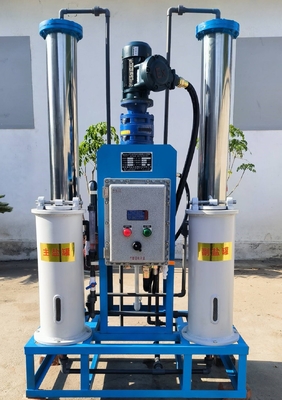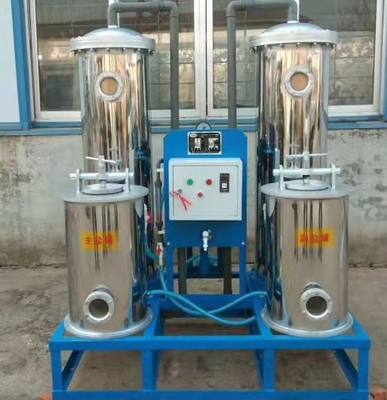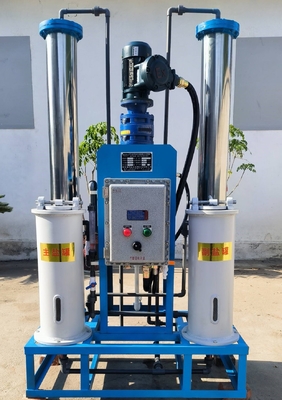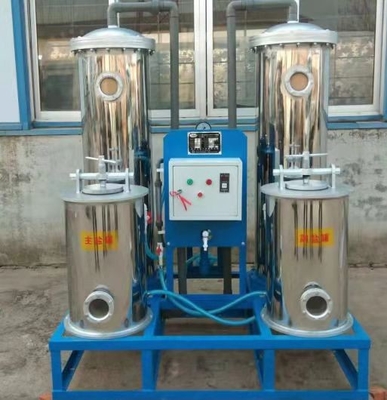-
Condensate Water Recovery Device
-
Reverse Osmosis Equipment
-
Fully Automatic Water Softener
-
Industrial Sand Filter
-
Water Supply Equipment
-
Chemical Dosing Device
-
Container Flipper
-
Container Loading and Unloading Machine
-
Truck Flipper
-
Electric Transfer Cart
-
Electronic Weighbridge
-
Mobile Loading Dock Ramp
-
Air Compressor Heat Recovery
-
Water Treatment Accessories
Customizable FRP Softening Water Treatment Equipment For Food And Chemical Industries

Contact me for free samples and coupons.
Whatsapp:0086 18588475571
Wechat: 0086 18588475571
Skype: sales10@aixton.com
If you have any concern, we provide 24-hour online help.
x| Features | High Automation Level, Stable Water Quality, High Efficiency, Low Energy Consumption, Low Operating Costs. | Brand | Tonglida |
|---|---|---|---|
| Materials | Fiberglass Reinforced Plastic (FRP), Stainless Steel, Carbon Steel | Origin | Taian, Shandong |
| Application Fields | Industrial Boilers, Central Air Conditioning Systems, Heat Exchangers, Hotels, Restaurants, Food And Chemical Industries, Laundry And Dyeing, Medical And Sanitation, Etc. | Product Specifications | 1-100T/H |
| Product Information | Automatic Water Softening Equipment - Dual-Tank, Single-Tank, Continuous Water Production | ||
| Highlight | frp softening water treatment equipment,customizable fully automatic water softener,customizable softening water treatment equipment |
||
Product Description:
The fully automatic water softener comes equipped with a comprehensive automatic control system that can be customized according to user requirements. It can operate as a single-tank or dual-tank system.
The system operates fully automatically, where one tank is used while the other serves as a backup. When the operating tank reaches the set water production capacity, it goes into regeneration mode, and the backup tank takes over the operation. The system includes several process stages that operate automatically. These stages include running, backwashing, brine suction, ion exchange, forward flushing, and standby.
The raw water flows through the resin tank, which contains ion exchange resin and an automatic control valve. The exchangeable ions undergo ion exchange, resulting in soft water with a hardness of ≤0.03mmol/L. Once the system reaches the set flow rate, the regeneration process begins.
The regeneration process involves several steps which are as follows:
- Backwashing: Water is directed upward through the bottom distributor to loosen the resin bed, and to remove accumulated suspended particles from the resin surface.
- Brine Suction Regeneration: Saturated brine solution is injected into the resin tank through the brine injector after dilution to a concentration of 5-8%. The brine solution flows downward through the deactivated resin bed, regenerating the resin.
- Exchange: This process includes two steps. Firstly, clean water is used to regenerate the residual brine, and secondly, regeneration waste liquid is displaced from the resin bed.
- Forward Flushing: This process helps to remove the residual regeneration waste liquid from the resin bed, leaving the water meeting the required standards.
| Project Name | Unit | 1T/H | 2T/H | 4T/H | 6T/H | 60T/H | 80T/H | 100T/H | |
| Inlet pressure | mpa | 0.15-0.25 | 0.2-0.3 | ||||||
| Water production | T/H | 0.8-1.2 | 1.8-2.2 | 3.8-4.2 | 5.7-6.2 | 55-65 | 70-90 | 90-110 | |
| Raw water turbidity | O | ≤2 | |||||||
| Raw water hardness | mmol/L | ≤15 | |||||||
| Residual hardness of soft water | mmol/L | ≤0.03 | |||||||
| Self-consumption water rate | % | 4 | |||||||
| Power supply | Single-phase electricity 50HZ 220V | ||||||||
| Diameter of exchange column | Stainless steel head | mm | ∅1000 | ∅1200 | ∅1400 | ||||
| Ordinary head | mm | ∅160 | ∅200 | ∅300 | ∅360 | ∅1000 | ∅1180 | ∅1400 | |
| Resin tank height | mm | ||||||||
| Inlet and outlet water pipeline | Solenoid valve | mm | DN15 | DN20 | DN40 | DN100 | DN125 | DN150 | |
| Valve body | mm | DN20 | DN25 | ||||||
| Flow meter | L/H | 60 | 100 | 100 | 160 | 2000 | 2000 | 2500 | |
| Resin filling capacity | Solenoid valve | KG | |||||||
| Total weight of equipment | KG | ||||||||
| Salt tank size | Self-processing | mm | 225*650 | 225*650 | 315*650 | 315*650 | 760*800 | 890*800 | |
| Purchase from outside | |||||||||
Features:
High levels of automation are a key aspect of our system. All of the crucial processes are highly automated and can be controlled remotely, ensuring that your system is running smoothly at all times. This automation also helps to reduce the chances of errors or problems occurring, as we have implemented strict protocols and checks to ensure that everything runs correctly.
Our system is designed to maintain stable water quality, which is critical for many industrial processes. We use sophisticated sensors and algorithms to keep the water clean and free from contaminants, ensuring that your operations can run smoothly without any interruptions or delays.
High efficiency is another crucial feature of our system. We have designed it to maximize productivity and minimize wasted resources, enabling you to achieve your goals with minimum effort. Our system also uses advanced techniques to reduce water consumption, which can help you save money on your utility bills.
Low energy consumption and low operating costs are key selling points of our system. We have designed it to be energy-efficient, using innovative technologies to reduce power consumption without sacrificing performance. This means that you can run your operations without having to worry about high energy bills or operating costs.
Technical Parameters:
Below are the revised contents:
1. Automatic control with simple and reliable operation.
The system includes an automated control system with a user-friendly interface for easy operation. The system is designed to ensure reliable and consistent performance.
2. Strong adaptability, capable of softening water with high hardness up to ≤15mmol/L to residual hardness ≤0.03mmol/L in a single pass.
The softening system features a strong adaptability suitable for softening water with high hardness levels of up to 15mmol/L to residual hardness of less than 0.03mmol/L in one pass.
3. Short regeneration time, low resin consumption, low salt consumption, stable water quality, and low operating costs.
The system features a short regeneration time, low resin consumption, and low salt consumption. The system also has a stable water quality, which reduces operating costs and ensures the effective and efficient use of the system.
4. Lightweight equipment with a compact and rational design, requiring a small footprint.
The system has a lightweight and compact design, which requires minimal space for installation. The system has a rational design that simplifies its operation and maintenance.
5. The complete machine is delivered from the factory, and installation is simple. Only the inlet and outlet pipes and power supply need to be connected to start water production.
The complete system is delivered from the factory, which simplifies installation. Only the inlet and outlet pipes and power supply are required to start water production. The installation process is simple, and customers can do it themselves or with minimal assistance from a professional.
Applications:
The automatic water softener serves as a vital solution for the circulating makeup water in different applications such as steam boilers, hot water boilers, heat exchangers, steam condensers, air conditioning systems, and direct-fired equipment and systems. Its versatility in different sectors has made it a go-to treatment solution for various industrial water treatments. It's also used in residential water treatment systems.
The use of automatic water softeners is beneficial in different industries such as food processing, pharmaceuticals, chemical manufacturing, printing and dyeing, electronics, and textile industries. This technology provides a cost-effective and efficient approach to water treatment and pre-treatment in desalination systems.
The hardness of water produced can result in the buildup of minerals and cause the equipment to malfunction or cause clogging, which can be costly and time-consuming to repair. The automatic water softeners treat water, reducing the hardness of produced water and mitigating the challenges that come with hard water. This process helps extend the lifespan of the equipment and reduces maintenance costs.
The automatic water softener technology can handle both single-stage or multi-stage water softening requirements. The treated water improves the quality of water and equipment performance. With this technology, industries can continue to enjoy optimal equipment performance.






